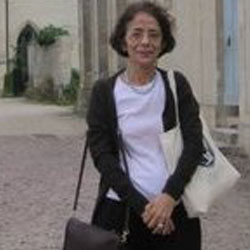Difference between revisions of "Marnia Lazreg"
m (Text replacement - " has served as " to " has been ") |
|||
| (One intermediate revision by one other user not shown) | |||
| Line 10: | Line 10: | ||
|death_date= | |death_date= | ||
|death_place= | |death_place= | ||
| + | |description=Historian with interest in the systemic function of torture | ||
|constitutes=historian, academic | |constitutes=historian, academic | ||
| − | |interests=torture | + | |interests=torture,post-modernism |
}} | }} | ||
| − | '''Professor Marnia Lazreg''' is interested in the systemic function of torture in maintaining [[empire]].<ref>http://www.unwelcomeguests.net/413</ref> | + | '''Professor Marnia Lazreg''' is interested in the systemic function of torture in maintaining [[empire]].<ref>http://www.unwelcomeguests.net/413</ref> She is a professor of sociology at [[Hunter College]], New York.<ref>http://www.hunter.cuny.edu/sociology/faculty/marnia-lazreg</ref> |
| + | |||
| + | She was awarded fellowships at the [[Brown University|Pembroke Center for Teaching and Research on Women (Brown University]]); the Bunting Institute ([[Harvard]]); The Institute for Advanced Study ([[Princeton]]), the [[Rockefeller Bellagio Center]], Italy, as well as a [[Fulbright grant]] to [[Algeria]]. | ||
| + | |||
| + | Apart from teaching, she has been consultant on gender and development for the [[United Nations Development Program]] as well as [[UNESCO]]. She has also worked as the coordinator for Europe and Central Asia at the [[World Bank]] wile also doing cross support work on the [[Middle East and North Africa]]. | ||
| + | |||
==Activities== | ==Activities== | ||
| − | "Her research focuses on the structures that inform cultural change as well as shape conceptions of self, identity and gender relations in societies undergoing the transition from colonial and/or economic dependence to political sovereignty. A parallel interest is to identify and theorize the frequent gap between theoretical concepts applied to non-Western societies and the reality they intend to explain, which may hamper cross cultural understanding."<ref>http://www.hunter.cuny.edu/sociology/faculty/marnia-lazreg</ref> | + | "Her research focuses on the structures that inform cultural change as well as shape conceptions of self, identity and gender relations in societies undergoing the transition from colonial and/or economic dependence to political sovereignty. A parallel interest is to identify and theorize the frequent gap between theoretical concepts applied to non-Western societies and the reality they intend to explain, which may hamper cross cultural understanding."<ref>http://www.hunter.cuny.edu/sociology/faculty/marnia-lazreg</ref> In continuity with her interest in culture, he also wrote on [[Michel Foucault]]’s struggles with how to theorize cultural difference.<ref> www.hunter.cuny.edu/sociology/faculty/marnia-lazreg</ref> |
| + | |||
{{SMWDocs}} | {{SMWDocs}} | ||
==References== | ==References== | ||
{{reflist}} | {{reflist}} | ||
| − | |||
Latest revision as of 23:10, 2 August 2022
(historian, academic) | |
|---|---|
 | |
| Alma mater | University of Algiers, New York University |
| Interests | • torture • post-modernism |
Historian with interest in the systemic function of torture | |
Professor Marnia Lazreg is interested in the systemic function of torture in maintaining empire.[1] She is a professor of sociology at Hunter College, New York.[2]
She was awarded fellowships at the Pembroke Center for Teaching and Research on Women (Brown University); the Bunting Institute (Harvard); The Institute for Advanced Study (Princeton), the Rockefeller Bellagio Center, Italy, as well as a Fulbright grant to Algeria.
Apart from teaching, she has been consultant on gender and development for the United Nations Development Program as well as UNESCO. She has also worked as the coordinator for Europe and Central Asia at the World Bank wile also doing cross support work on the Middle East and North Africa.
Activities
"Her research focuses on the structures that inform cultural change as well as shape conceptions of self, identity and gender relations in societies undergoing the transition from colonial and/or economic dependence to political sovereignty. A parallel interest is to identify and theorize the frequent gap between theoretical concepts applied to non-Western societies and the reality they intend to explain, which may hamper cross cultural understanding."[3] In continuity with her interest in culture, he also wrote on Michel Foucault’s struggles with how to theorize cultural difference.[4]
References
- ↑ http://www.unwelcomeguests.net/413
- ↑ http://www.hunter.cuny.edu/sociology/faculty/marnia-lazreg
- ↑ http://www.hunter.cuny.edu/sociology/faculty/marnia-lazreg
- ↑ www.hunter.cuny.edu/sociology/faculty/marnia-lazreg